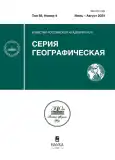The Impact of Water Management on the Water Resources of the Sea Basins on the European Russia
- Authors: Koronkevich N.I.1, Lukyanov K.V.1
-
Affiliations:
- Institute of Geography, Russian Academy of Sciences
- Issue: Vol 88, No 4 (2024)
- Pages: 544-553
- Section: NATURAL RESOURCE USE AND GEOECOLOGY
- URL: https://journals.eco-vector.com/2587-5566/article/view/660843
- DOI: https://doi.org/10.31857/S2587556624040077
- EDN: https://elibrary.ru/RPMTFX
- ID: 660843
Cite item
Abstract
The article examines the features of the spatial and temporal distribution of the influence of water management activities on the quantity of water resources and the quality of water in the basins of the seas washing the European Russia ’ s territory. As an indicator of water resources, the average long-term flow of rivers is used. The influence of water withdrawal and water consumption on it is assessed, as well as the impact on water quality of wastewater (including return water from irrigated fields) as one of the main sources of pollution of water resources. Water consumption and the wastewater volume are determined for two years: 1992 (the time of maximum water use for most regions of Russia) and 2020 (characterizing modern water use). The calculation is based on water management statistics data obtained from various reference books. A significant (almost double) decrease of anthropogenic impact on water resources in 2020 compared to 1992 is shown. However, as before, the most tense water management and hydroecological situation arises in the basins of the Azov and Caspian seas, although it is also unfavorable for individual river basins of the Baltic, White, Barents, and Black seas’ watersheds, especially in terms of water quality.
Full Text
About the authors
N. I. Koronkevich
Institute of Geography, Russian Academy of Sciences
Author for correspondence.
Email: koronkevich@igras.ru
Russian Federation, Moscow
K. V. Lukyanov
Institute of Geography, Russian Academy of Sciences
Email: kirill.lukyanov.96@mail.ru
Russian Federation, Moscow
References
- Antropogennye vozdeistviya na vodnye resursy Rossii i sopredel’nykh gosudarstv v kontse XX stoletiya [Anthropogenic Impacts on Water Resources in Russia and Neighboring Countries at the End of the 20th Century]. Moscow: Nauka Publ., 2003. 344 p.
- Babkin V.I., Balonishnikova Zh.A . Water balance, water resources and water use in the largest river basins of Russia. In Voprosy geografii, Sb. 145: Gidrologicheskie izmeneniya [Problems of Geography. Vol. 145: Hydrological Changes]. Moscow, 2018, pp. 35–48. (In Russ.).
- Chernogaeva G.M., Zhuravleva L.R., Malevanov Yu.A. Integral assessment of water quality in the Volga basin based on monitoring data in the 21st century. Izv. Akad. Nauk, Ser. Geogr ., 2023, no. 6, pp. 875–884. (In Russ.).
- Demin A.P. Wastewater and water quality in the Volga River basin (2000–2015). Uchen. Zapis. Ross. Gos. Gidromet. Univ. , 2017, no. 48, pp. 55–71. (In Russ.).
- Demin A.P. Water consumption and water disposal in the Volga River basin, their influence on water quality. Izv. Akad. Nauk, Ser. Geogr ., 2023, no. 6, pp. 847–861. (In Russ.).
- Diffuznoe zagryaznenie vodnykh ob’’ektov: problemy i resheniya [Diffuse Pollution of Water Bodies: Problems and Solutions]. Moscow: Ross. Akad. Nauk, 2020. 512 p.
- Gosudarstvennyi doklad “O sostoyanii i ispol’zovanii vodnykh resursov Rossiiskoi Federatsii v 2018 godu” [State Report “On the State and Use of Water Resources of the Russian Federation in 2018”]. Moscow: NIA-Priroda, 2019. 290 p.
- Gosudarstvennyi doklad “O sostoyanii i ob okhrane okruzhayushchei sredy Rossiiskoi Federatsii v 2020 godu” [State Report “On the State and Protection of the Environment of the Russian Federation in 2020”]. Moscow: Minprirody Rossii; Mosk. Gos. Univ., 2021. 864 p.
- Koronkevich N.I., Barabanova E.A., Zaitseva I.S. Voda i chelovek [Water and Man]. Moscow: Pero Publ . , 2022. 324 p.
- Koronkevich N.I., Chernogaeva G.M., Dolgov S.V., et al. Anthropogenically changed water entering water bodies in the Don Basin. Russ. Meteorol. Hydrol. , 2023, vol. 48, pp. 541–547. https://doi.org/10.3103/S1068373923060067
- Koronkevich N.I., Zaitseva I.S., Kitaev L.M. Negative hydroecological situations. Izv. Akad. Nauk, Ser. Geogr. , 1995, no. 1, pp. 43–53. (In Russ.).
- Luk’yanov K.V., Koronkevich N.I. Features of the distribution of waste and return waters on the territory of the European part of Russia. Izv. Akad. Nauk, Ser. Geogr ., 2022, no. 5, pp. 763–778. (In Russ.).
- Obzor sostoyaniya i zagryazneniya okruzhayushchei sredy v Rossiiskoi Federatsii za 2020 god [Review of the State and Pollution of the Environment in the Russian Federation for 2020]. Moscow, 2021. 205 p.
- Reshetnyak O.S. Spatiotemporal patterns of transformation of the chemical composition and quality of river waters in the European part of Russia. Extended Abstract of Dr. Sci. (Geogr.) Dissertation. Rostov-on-Don, 2023. 46 p.
- Resursy poverkhnostnykh i podzemnykh vod, ikh ispol’zovanie i kachestvo: Ezhegod. [Surface and Groundwater Resources, Their Use and Quality: Annually]. St. Petersburg, 1982–2020.
- Shaporenko S.I. Long-term variability of indicators of water management activities in watersheds and its possible impact on water quality at the mouths of northern rivers. In Voprosy geografii. Sb. 157: Vodnye problemy i ikh reshenie [Problems of Geography. Vol. 157: Water Problems and Their Solutions]. Moscow, 2023, pp. 58–80. (In Russ.).
- Vodnye resursy Rossii i ikh ispol’zovanie [Water Resources of Russia and Their Use]. Shiklomanov I.A., Ed. St. Petersburg: Gos. Gidrolog. Inst., 2008. 600 p.
Supplementary files










